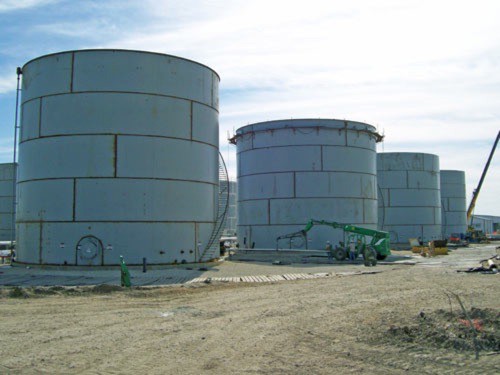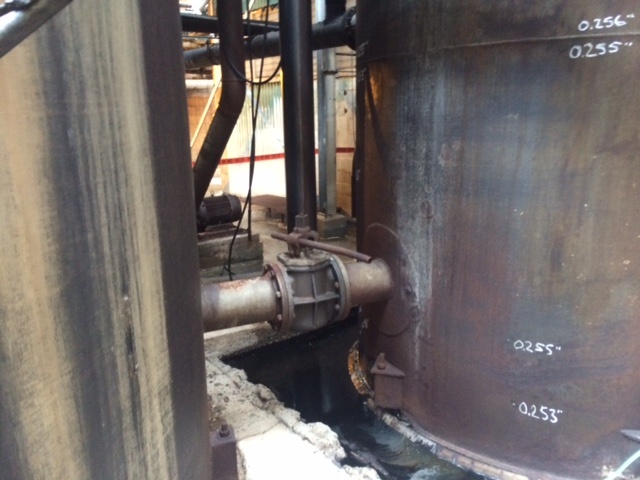The Benefits of Welding Examination for Enhanced Safety and Performance
Welding evaluations are important for ensuring that structures meet strict sector criteria. They play a crucial role in determining flaws early, thus improving safety and security and decreasing the danger of catastrophic failures. Furthermore, these assessments can cause significant expense savings by stopping pricey repair services and downtime. As organizations go for improved efficiency and reliability, the relevance of a durable inspection procedure can not be overemphasized. What other advantages might emerge from a commitment to thorough welding examinations?
Making Sure Compliance With Industry Specifications
Guaranteeing compliance with sector criteria is important for maintaining top quality and safety and security in welding tasks. Sticking to well-known protocols not just secures workers but additionally improves the sturdiness and efficiency of the last item. Welding evaluations conducted at various stages of the process assistance determine any variances from these standards, making it possible for timely restorative activities. This positive method reduces the risk of failures that can arise from low quality handiwork.
Moreover, conformity with sector requirements promotes trust fund amongst stakeholders, including customers, regulative bodies, and the labor force. It indicates a commitment to quality and responsible techniques, which can bring about enhanced organization possibilities and an affordable edge out there - API 650 Welding Inspection. Routine inspections likewise ensure that strategies and products used straighten with the most up to date technical innovations and safety guidelines. Inevitably, adherence to market standards is not just a regulative need but a foundation of quality control in welding jobs
Enhancing Safety And Security Through Early Detection of Defects
While the primary objective of welding examinations typically focuses on conformity, they play an important duty in boosting safety by allowing the early discovery of problems. Determining issues such as incomplete blend, fractures, or porosity throughout evaluations can greatly minimize the danger of devastating failures. Early detection enables for prompt treatments, making sure that malfunctioning welds do not jeopardize architectural integrity.
In addition, organized evaluations foster a culture of security within companies by highlighting the relevance of quality control. This positive approach not only secures employees yet also safeguards the surrounding environment. Normal assessments can disclose trends in flaw occurrence, permitting for adjustments in welding techniques and training programs to address underlying concerns.
Subsequently, welding inspections offer as an important guard, reinforcing overall safety and security and performance by identifying defects prior to they intensify into severe threats. This dedication to quality directly adds to the long life and reliability of bonded structures.
Decreasing Prices by Protecting Against Failings
By carrying out extensive welding assessments, organizations can properly reduce costs related to failings and rework. The aggressive recognition of defects during the welding procedure decreases the danger of devastating failures that can lead to pricey fixings or replacements. Early detection enables prompt treatments, which prevents the acceleration of minor problems right into major troubles that strain resources and budgets. Additionally, by ensuring that welds meet specified criteria, organizations can prevent hold-ups in project timelines brought on by the demand for substantial rework or extra examinations later in the process. This not just saves cash however also improves operational performance. A credibility for top quality handiwork can lead to increased client contentment and repeat business, additional adding to financial security. On the whole, purchasing welding assessments is a critical strategy that promotes expense financial savings while securing the integrity of welded frameworks.
Improving Performance and Longevity of Structures


Welding inspections play a vital function in enhancing the efficiency and longevity of frameworks, as they verify that welds are executed to the highest possible criteria. By identifying flaws early in the welding procedure, evaluations prevent weak points that could endanger architectural stability. This aggressive strategy guarantees that the materials utilized meet needed specifications, thereby maximizing their load-bearing ability and resilience.
Regular monitoring of welding methods adds to the overall high quality of construction jobs. The capacity for tiredness and failure over time is significantly decreased when welds are verified for conformity with sector criteria. Structures that are built with appropriately inspected welds linked here are most likely to experience less maintenance concerns and boosted longevity.
Ultimately, rigorous welding assessments not just reinforce the prompt performance of a framework yet additionally extend its functional life-span, supplying long-lasting value to both end-users and building contractors alike.
Cultivating a Culture of High Quality and Reliability
A dedication to top quality and dependability in welding practices considerably adds to the total success of building and construction jobs. They cultivate a culture that urges careful focus to detail and adherence to sector standards when companies prioritize these values. This society not only boosts the ability level of welders yet also advertises accountability and teamwork amongst all stakeholders included in the task.

Normal welding evaluations work as a cornerstone in this social shift, enhancing the significance of constant efficiency and safety and security see this steps (API 650 Welding Inspection). By implementing strenuous inspection methods, business can recognize potential flaws early, mitigating risks and preventing pricey rework. Furthermore, a concentrate on high quality and integrity infuses confidence amongst companions and customers, causing stronger relationships and improved track records
Ultimately, promoting a culture of quality and integrity in welding practices not just elevates job end results however likewise ensures lasting sustainability and success in the building sector.
Often Asked Concerns
What Qualifications Should a Welding Assessor Have?
A welding assessor should possess relevant certifications, such as AWS CWI or CSWIP. Furthermore, they should have experience in metallurgy, welding processes, and assessment strategies, along with strong analytical skills and focus to information for effective assessments.

Just How Typically Should Welding Inspections Be Performed?
Welding evaluations need to be conducted on a regular basis, preferably after each substantial stage of the welding process. In addition, routine evaluations ought to happen based on task demands, solution problems, and governing standards to guarantee recurring top quality and security.
What Devices Are Utilized During Welding Inspections?
Welding assessments utilize numerous devices, consisting of ultrasonic testers, magnetic particle testers, aesthetic inspection tools, and radiographic devices. Each tool serves a details purpose, ensuring weld top quality and structural integrity via thorough exam and evaluation.
Can Welding Inspections Be Executed From Another Location?
Welding inspections can certainly be carried out from another location using innovative technologies such as drones and specialized cams. These devices make it possible for inspectors to evaluate welding quality and stability from a distance, boosting efficiency and safety in different atmospheres.
What Are the Typical Types of Welding Problems?
Common kinds of welding issues include porosity, cracks, incomplete blend, undercutting, and slag addition. These issues can jeopardize the integrity and stamina of welds, resulting in potential failings in structural applications if not addressed correctly.
Welding examinations are crucial for ensuring that frameworks meet strict sector requirements. Welding examinations site link conducted at various stages of the procedure aid identify any discrepancies from these requirements, enabling prompt rehabilitative activities. Welding assessments play a crucial function in enhancing the performance and durability of structures, as they confirm that welds are performed to the highest standards. Welding inspections must be carried out consistently, preferably after each considerable stage of the welding process. API 650 Welding Inspection. Welding examinations use various tools, including ultrasonic testers, magnetic fragment testers, aesthetic assessment devices, and radiographic devices